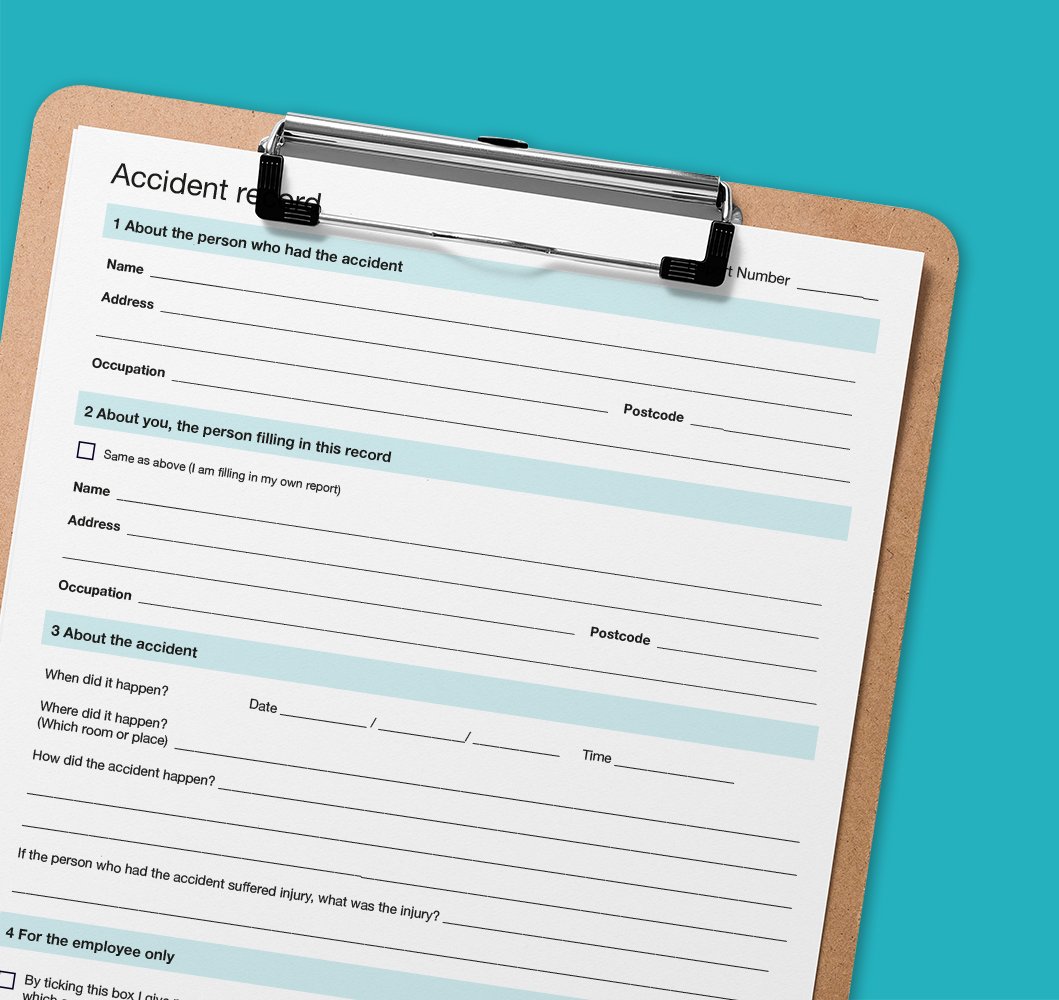Workplace accident reporting - with free accident book template!
“Do I need an accident book?” “Do I need to report an accident to RIDDOR?” “How do I report an accident?”–In this short article, we’ll be answering all your questions on reporting workplace accidents.
We are also providing a free interactive accident reporting template. The template is designed to help you record and keep track of accidents and incidents, and can either be filled in digitally or printed and taken with you.
Recording a workplace accident
Do I need an accident book?
Organisations with more than 10 employees must have an accident book. This may be a physical book or a digital system, but it needs to be secure and confidential.
Our free accident report templates can be signed digitally or printed and taken with you.
What accidents do I need to record?
You need to record any reportable workplace incidents, plus any incident which leaves the worker unable to do their normal job for more than three consecutive days.
It is also advised that you record all workplace accidents, despite the severity.
You should record all injuries and ‘near-misses’ whether the injured person is an employee or a member of the public who has had a workplace-injury.
Recording all incidents may help you spot risks, and make your workplace safer.
Reporting a workplace incident (through RIDDOR)
In the UK, certain incidents will need to be reported under RIDDOR (Reporting of Injuries, Diseases and Dangerous Occurrences Regulations).
What incidents need to be reported through RIDDOR?
Most incidents (such as small cuts and sprains) do not need a RIDDOR report. However a RIDDOR report will need to be filled out on the HSE (Health and Safety Executive) website, if the incident meets certain criteria.
Generally speaking, accidents are reported through RIDDOR if they are serious and work-related. Organisations may also need to report certain dangerous accidents, whether someone has been hurt or not.
Types of reportable injuries:
Deaths –including via acts of violence, but not suicide
Injuries specified by the HSE as being particularly serious –usually involving fractures, amputation, permanent damage to sight, organ damage, ‘serious’ burns, scalpings, or certain serious illnesses resulting from being in an enclosed space.
Over-seven-day injuries –an injury which leaves the worker unable to do their normal job for more than seven consecutive days.
Injuries to members of the public –work related incidents that require a member of the public to be taken to the hospital for their injuries.
Occupational diseases –a wide range of inflictions including occupational asthma, cancer and dermatitis, as well as conditions like carpal tunnel syndrome and hand-arm vibration syndrome (HAVS).
Dangerous occurrences –particularly dangerous examples of ‘near-misses’ including the collapse of lifting equipment, equipment hitting power lines, and serious fires or explosions
Who can report through RIDDOR?
Your organisation should already have assigned ‘responsible persons' who handle your health and safety (this includes ‘employers, the self-employed and people in control of work premises’).
Usually, the person responsible for updating your accident book will be responsible for reporting incidents through RIDDOR.
If you are not an assigned ‘responsible person’, and have been involved in a reportable incident, you are encouraged to talk with the workplace and make sure it is recorded. If you have concerns that an incident or health and safety matter is not being properly handled, you can contact the HSE directly via their website.
Our free accident report templates can be signed digitally or printed and taken with you.
How to report an incident through RIDDOR
When a reportable incident has occured, your responsible person should report it:
Online, at www.hse.gov.uk/riddor
By calling the Incident Contact Centre on 0845 300 9923 (opening hours Monday to Friday 8.30 am to 5 pm). All incidents can be reported online but a telephone service remains for reporting fatal and specified injuries only.




